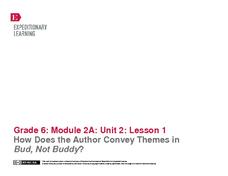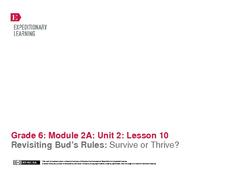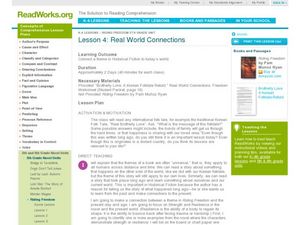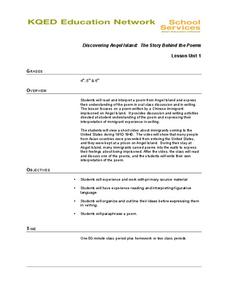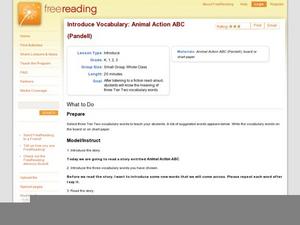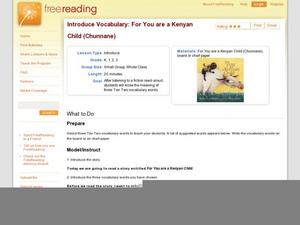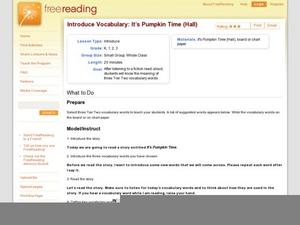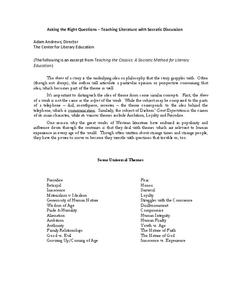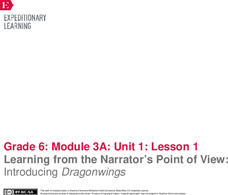EngageNY
How Does the Author Convey Themes in Bud, Not Buddy?
After reading up to chapter 12 of Bud, Not Buddy by Christopher Paul Curtis, scholars read chapter 13 and take part in a grand conversation about the author's writing techniques. Pupils discuss how his writing conveyed literary themes...
EngageNY
Planning for Writing: Introduction and Conclusion of a Literary Argument Essay
After completing three body paragraphs of an argument essay about life's rules to live by from Bud, Not Buddy Christopher Paul Curtis, it's time to begin writing the introduction and conclusion. Independently, pupils draft the final two...
EngageNY
Revisiting Bud’s Rules: Survive or Thrive?
Bud followed a series of rules from Bud, Not Buddy by Christopher Paul Curtis. The question is, how did he use those rules to thrive or survive? After a grand discussion, class members explore the novel to locate and cite textual...
Curated OER
Mad-Libbing Your Way Into Modern Poetry
Use a Mad-Libs like activity to create modern poetry! Writers will identify different words and their parts of speech and study "The Red Wheelbarrow" by Williams Carlos Williams. Then, use the sheets attached to craft your own poem! An...
Curated OER
Rediscovering Forgotten Women Writers
Women's voices are becoming more prominent in the world of literature, but for centuries, this wasn't the case. Young historians research a woman whose writings are considered to be lost, out of print, or forgotten. They develop an oral...
Curated OER
Save the Lofty Trees
Save the Lofty Trees, by Leslie Mills, provides the text for a study of the roles of animals and humans in the forest. Richly detailed, the plan offers two approaches to the play: as a scenario for children to imagine what actions would...
Curated OER
Go Free or Die
Groups of older elementary learners begin their study of figurative language by visiting a website and completing the exercises detailed there. They then apply what they have learned by finding examples in several poems. Finally, they...
Curated OER
Real World Connections
Explore universal themes in literature with a literacy and multicultural awareness instructional activity. Elementary and middle schoolers make real world connections between themes in books from several cultures. They make inferences...
Curated OER
Discovering Angel Island: The Story Behind the Poems
Poems carved into the wooden walls of the Asian immigrant prisons on Angel Island provide upper elementary graders an opportunity to study not only the story behind the poems but to also focus on the figurative language employed by the...
Curated OER
Introduce Vocabulary: Animal Action ABC (Pandell)
Get your kinesthetic learners engaged in a vocabulary study using Karen Pandell's book, Animal Action ABC. They move around as you read, and raise their hands whenever they hear one of the words you are learning. Pre-teach the terms:...
Curated OER
Introduce Vocabulary: Doctor DeSoto (Steig)
William Steig's story of a witty mouse couple will have scholars intrigued as they listen for new vocabulary words and context clues. Doctor DeSoto can be found on YouTube in case you don't have it. Emerging readers expand their...
Curated OER
Introduce Vocabulary: For You are a Kenyan Child (Chunnane)
Discover that Kenyan children aren't much different from your young scholars as they read Kelly Cunnane's story For You are a Kenyan Child. This story is an excellent resource for vocabulary in context, and introduces new words...
Curated OER
Introduce Vocabulary: I Am Planet Earth (Marzollo)
Explore the world's beauty with Jean Marzollo's colorful book I Am Planet Earth, the context of a vocabulary study focused on the following in-text words: globe, jungle, paddy, planet, and valley. Discuss the text briefly and introduce...
Curated OER
Introduce Vocabulary: I Hate To Be Sick (Bermiss)
No one likes being sick; use Aamir Bermiss' book I Hate To Be Sick as the context for a vocabulary study of illness-related words. Acquaint pupils with this unhealthy vocabulary (dizzy, faint, fever, gag, and sore) before reading aloud,...
Curated OER
Introduce Vocabulary: It's Pumpkin Time (Hall)
Looking for a Halloween-themed vocabulary lesson? Study words in context using Zoe Hall's story It's Pumpkin Time, an excellent informational text for budding readers. The spooky suggested words are: buds, gather, hollow,...
Curated OER
Introduce Vocabulary: Puff, the Magic Dragon (Yarrow and Lipton)
Puff the Magic Dragon remains a childhood landmark for budding readers (and singers), but did you know it also makes an excellent vocabulary study? By focusing on several in-text words (in this case: billow, cease, fearless,...
Curated OER
Introduce Vocabulary: Ruby the Copycat (Rathmann)
Have your scholars ever known someone who was a copycat? Approach this issue as you study vocabulary in context by reading Peggy Rathmann's book Ruby the Copycat. Proposed focus words are: recite, murmur, plop, and coincidence. Go over...
Writing Educators Symposium
Asking the Right Questions
It can be difficult to find the theme of a book or story if you don't know the questions to ask. Teach your kids to discern the universal theme in works of literature with a set of activities that promote critical thinking and active...
Fluence Learning
Writing Informative Text: Did Shakespeare Write Shakespeare?
William Shakespeare penned some of the richest and most fascinating works of literature—or did he? Middle schoolers read three brief informative passages and conduct additional research to evaluate the claim that Shakespeare did not...
Houghton Mifflin Harcourt
Problem Solvers: Challenge Activities (Theme 4)
Creative activities help bring literature alive. The first of a set of lessons designed to accompany selections from Theme 4: Problem Solvers uses activities such as skits, responses to music, and social studies projects. These...
Curated OER
Agriculture Awareness Through Poetry
Whether you are viewing a landscape painting of a farm, examining a still-life portrait of a bowl of fruit, or reading a descriptive poem about cultivating food, you can't deny that agriculture plays a major role in visual and language...
K20 LEARN
Voices from the Past: History and Literature
Art can enhance the understanding of history. That's the big idea in a lesson that has young scholars read Randall Jarrell's poem "The Death of the Ball Turret Gunner" and an excerpt from John Hersey's Hiroshima, which provide a...
Stephen F. Austin State University, College of Fine Arts
The Ugly Duckling
It's not about what you look like on the outside! A study guide for the stage adaptation of The Ugly Duckling reminds learners that being cruel to those in need is not helpful—and that we all belong somewhere.
EngageNY
Learning from the Narrator’s Point of View: Introducing Dragonwings
Journey into the past with Laurence Yep's Dragonwings. Scholars complete anchor charts to analyze techniques the author uses to develop the narrator's point of view in his novel. As they read, pupils also complete word catchers to track...


